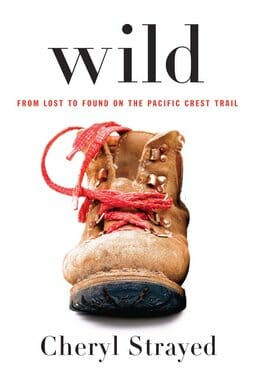Into the Wild with Dear Sugar, aka Cheryl Strayed

In 1995, Cheryl Strayed was 26, freshly divorced and turned-on to heroin, a few months past an abortion, and for all intents and purposes an orphan on her own in the world. With no place to be and no one to be any place with, she found a book in a store, traced her finger across a line on a map, and decided to follow that jagged line across the mountains of the Pacific Crest Trail.
Wild is the true story of how walking that line took Strayed from where she started to the person she is today—a successful, critically acclaimed writer and also the voice behind the beloved advice column Dear Sugar. In the column, she doles out advice anonymously (Spoiler Alert: The author revealed her identity this Valentine’s Day, reasoning people would read this new book and figure it out for themselves anyway) with just the right combination of toughness and warmth, a balance she also walks in this book like a tightrope.
That sure balance also makes Strayed a powerful advocate for VIDA, the organization she helped found in support of women’s writing. Both Strayed and her alter-ego Sugar are feminist, but their feminism is not just hard the way some people mistake all feminism to be. It is soft and warm too.
Full disclosure: In 2002, at the age of 21, depressed and set on dropping out of college, I put my finger on a line on a map in a book and decided to walk that line until whatever had shut off inside me turned back on again. (I’m pretty sure this is a Sugarism, and if not, it is definitely inspired by recently re-reading all of Strayed’s writing to prepare for this review.)
The line my finger traced was the Appalachian Trail. I have struggled since with how to write about that specific experience. Though, like Strayed, I emerged at the other end of that wilderness tunnel in better physical and mental shape than I went in, it’s been particularly difficult terrain to retrace with a pen. Reasons?
1. A huge part of the whole point of long trail hiking involves monotony, repetition and Zen. You do it because you want to replace the ups and downs of daily life with the ups and downs of your feet. You do it because you want to be able to see your future literally stretching out before you on the horizon. Peaceful, difficult repetition with a view during day after day of hiking clears out your brain and gives you massive, muscled legs … but not much in terms of plot development.
2. Everyone moves at his or her own pace. (The cliché is true.) So, the people you meet on a long hike appear for brief interludes and then disappear. This poses a real problem in creating lasting, memorable characters.
3. What do people who have not spent months living in the woods and pooping in holes every day find most interesting about hiking a long trail? The idea of being surrounded by the serene beauty of nature for a long time. The catch is that the longer the serene beauty of nature surrounds you, the more you crave comforts. The journal from your long hike should fill with descriptions of plants and beautiful vistas, but you arrive home to find fantasies of warm baths, glamorous outfits, hot food and lipstick.
4. Hiking a long trail, you endure bad things. You run out of water and have to walk a long distance and drink from a muddy pond. You fall down with all your possessions strapped to your back and you get up bleeding and keep walking. You find yourself in a situation with a strange man—exactly the kind of strange man you have always been warned to stay away from. You eat terrible instant food that leads to nearly erotic dreams about the mediocre food that regular people eat all the time. Why? You have deliberately inflicted all of these obstacles and sufferings on yourself to prove how tough you are. But the main thing you end up proving is how stubborn you are—that you can put one foot in front of the other for a longer time than most other people.
In writing about this crazy suffering you brought upon yourself, it is difficult not to sound a bit spoiled and whiney. True even if—like Strayed—you spent literally every penny you saved waitressing to fund your hike or, like me, you telemarketed for six months. You imagine the reader thinking, “If she is so miserable, why doesn’t she just get off the trail and stop whining?”
In Wild, Strayed faces these writing obstacles with the same bravery and insight she used to face obstacles that confronted her on the trail. I kept thinking of her first book, Torch, where she described how a character’s advanced cancer felt prior to diagnosis: “As if her spine were a zipper and someone had come up behind her and unzipped it and pushed his hands into her organs and squeezed, as if they were butter or dough, or grapes to be smashed for wine.”
-

-

-

-

-

-

-

-

-

-

-

-

-

-

-

-

-

-

-

-

-

-

-

-

-

-

-

-

-

-

-

-

-

-

-

-

-

-

-

-








































